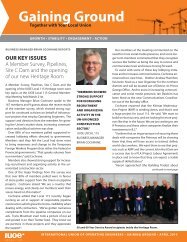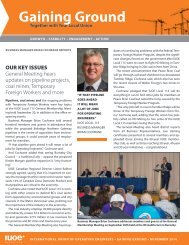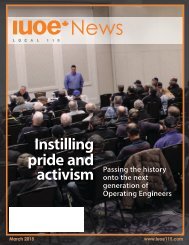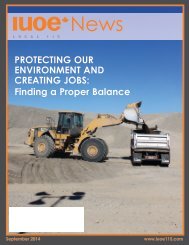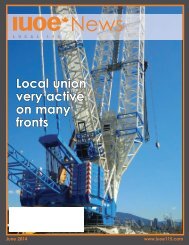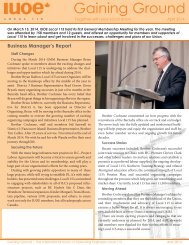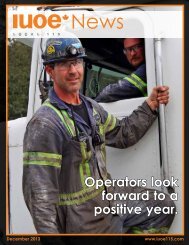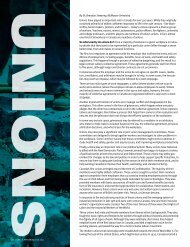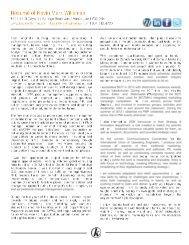Line Creek Mine
Feature Article - Line Creek Mine
Feature Article - Line Creek Mine
Create successful ePaper yourself
Turn your PDF publications into a flip-book with our unique Google optimized e-Paper software.
<strong>Line</strong> <strong>Creek</strong> <strong>Mine</strong><br />
by Leslie Dyson<br />
<strong>Line</strong> <strong>Creek</strong> <strong>Mine</strong>, one of five in Elk Valley in the southeast<br />
of the province, commenced operation in June 1981.<br />
Member Rep Gordie Chaisson, formerly a heavy duty<br />
mechanic, was hired by <strong>Line</strong> <strong>Creek</strong> <strong>Mine</strong> and joined the union<br />
in March 1984. In 1987, he accepted the position of assistant<br />
chief shop steward.<br />
The coal industry is sensitive to peaks and valleys in the<br />
marketplace. Chaisson got caught up in one of the layoff periods<br />
in 1987 and was out of work for 10 months.<br />
The market saw significant improvements in 1989 and<br />
the mine began hiring again. Chaisson became the chief shop<br />
steward and held the post until 1994. He accepted the role of<br />
member rep in Local 115 in ’96.<br />
There are many mines on either side of the Rocky<br />
Mountains. <strong>Line</strong> <strong>Creek</strong> is the only one in the area represented<br />
by IUOE Local 115. In the fall of 1989, negotiations broke<br />
down over the number of breaks on a shift and banked time.<br />
The members went on a seven-week strike. They returned to<br />
Focus on <strong>Line</strong> <strong>Creek</strong> <strong>Mine</strong><br />
There’s a rule of thumb in mining. For every mine job, there are up to seven spinoff<br />
jobs. There are 425 IUOE members working at <strong>Line</strong> <strong>Creek</strong> <strong>Mine</strong>. There are a total<br />
of 3,000 mine workers in the area. Multiply that figure by seven and you can see the<br />
degree to which the communities of Sparwood, Fernie, Elkford and Crowsnest Pass<br />
rely on the mines for their very existence.<br />
work in September after agreeing to a trial period in<br />
which the number of breaks was reduced from five to<br />
three and banked time up to 48 hours was introduced.<br />
continued next page<br />
<strong>Line</strong> <strong>Creek</strong>’s founding fathers<br />
Among the original hires at the mine, the<br />
“founding fathers,” according to Member Rep<br />
Gord Chaisson, were Brothers Rick Adams,<br />
Graham Atkinson, Murray Auld, Carl Cimolini,<br />
Kim Filipuzzi, Skip Gettman, Warren Jones, Dan<br />
Jungert, Jerry Kumiszizo, Derek Luznar, Dan<br />
McKay, Dave Munro, Phil North, Percy Rector,<br />
Lou Tait, Darrell Vance and Terry Walsh. “They<br />
had next to nothing to work with,” said Chaisson.<br />
“Basically, they turned on the lights.”<br />
September 2012 News 17
Focus on <strong>Line</strong> <strong>Creek</strong> <strong>Mine</strong><br />
Safety work and<br />
working safely<br />
Brother Gary Letcher, a light-duty mechanic at<br />
<strong>Line</strong> <strong>Creek</strong> <strong>Mine</strong> since ’82, said the work “puts meat<br />
on the table and the kids through school. So, I have<br />
no complaints.”<br />
Letcher is also the safety chair of the union’s mine<br />
council and co-chair of the company’s Occupational<br />
Health and Safety Committee. While every crew<br />
has a safety rep and shop steward, his committees<br />
are charged with “looking at the bigger picture and<br />
making it a better place to work,” he said.<br />
“I believe we’re just as good, if not safer than<br />
other mines,” he added. “We have our little disagreements<br />
[between the union and the company],<br />
but you move onto the next issue. We don’t hold a<br />
grudge. We’re professional about it. It’s about maintaining<br />
integrity.”<br />
IUOE members have to be watchful for wall<br />
failures in the open pit mine and dump failures,<br />
and wary of all the risks associated with working at<br />
height and around large equipment. It’s also a highvoltage<br />
site with 7,200 volts going through the power<br />
lines. Effective communication is essential, Letcher<br />
added, and everyone has to be properly trained.<br />
<strong>Line</strong> <strong>Creek</strong> <strong>Mine</strong> did have a fatality a number<br />
of years ago. A contract driller was pinned under<br />
equipment when it rolled over.<br />
“You have to work at safety every day,” Letcher<br />
said. “Safety is always a work in progress.”<br />
18 News September 2012<br />
continued from previous page<br />
Chaisson said the three unions representing the five<br />
mines (IUOE, United <strong>Mine</strong> Workers and Steelworkers)<br />
meet regularly to talk about common concerns and share<br />
strategies.<br />
“The coal industry flip flops every eight to ten years,”<br />
he added. Another economic downturn in 1999 resulted<br />
in the layoff of 80 people, but the recall started after just<br />
two months.<br />
That was not the case in March 2003. The company,<br />
owned by Fording Income Trust, instituted a 50% layoff.<br />
More than 200 people lost their jobs. “Those were very,<br />
very difficult times. We were told it had to make <strong>Line</strong><br />
<strong>Creek</strong> profitable,” said Chaisson, “but I believe liars figure<br />
and figures lie. It hurt everybody, financially and emotionally.”<br />
The union was able to negotiate a voluntary layoff<br />
package with severance pay.<br />
Shortly after, the company name was changed to Elk<br />
Valley Coal Corp. However, in 2004, “Teck Coal bought<br />
out everybody.” It took over ownership of the five mines<br />
in the area and several in Alberta.<br />
By the end of 2005, all employees on the mine’s recall<br />
list had been called back to work. However, Chaisson estimates<br />
that 25% of those who were laid off never returned<br />
and some left the area completely.<br />
By 2006, the coal market was picking up and more<br />
people were being hired.<br />
Even though the world economy took a hit in 2008,<br />
Teck offered its employees profit-sharing and gain-sharing<br />
programs, a trades retention bonus, a physical fitness<br />
program with reimbursements up to $1,000 and an<br />
across-the-board 5% pay raise—all in an effort to prevent<br />
its experienced workers from being lured to the Alberta<br />
oil sands, Chaisson said.<br />
The most recent collective agreement was ratified in<br />
February 2010 and will take the members to 2014. “The<br />
agreement is still top notch in the industry,” Chaisson<br />
added.<br />
One of Chaisson’s “proudest moments” took place in<br />
2000.<br />
IUOE members on the <strong>Line</strong> <strong>Creek</strong> <strong>Mine</strong> Rescue Team<br />
were winners in the highly challenging provincial competition<br />
that year. Events reflect the adrenaline-pumping<br />
actions that these teams must be prepared for.<br />
The Sparwood union office acknowledged the team’s<br />
achievement by purchasing a $7,000 defibrillator for the<br />
mine site. Less than six months later, a member collapsed<br />
on the job from a heart attack. The team put the machine<br />
to work and had to hit him three times to get his heart<br />
pumping again. Medical staff at the hospital said the defibrillator<br />
saved his life.
Shortly after, the company bought a second machine for use<br />
in the plant.<br />
The union is known in the community for its generosity.<br />
“We’re a sucker for kids,” Chaisson admitted. Local 115 has<br />
helped the Lions’ Club build a water park, provided numerous<br />
post-secondary scholarships and provided financial assistance<br />
for Toys for Tots, dry grad celebrations, a tae kwon do club, the<br />
Salvation Army and search and rescue. Members also volunteer<br />
on the search and rescue teams and as firefighters. Many members<br />
also voluntarily contribute, through payroll deductions, to<br />
an emergency humanitarian fund for other union members who<br />
find themselves in deep hardship due to health or other family<br />
emergencies.<br />
Chaisson expects to retire next year. As the workforce ages,<br />
the company is looking at its demographics, Chaisson said. He’s<br />
gratified to see the company hiring younger people and the<br />
increasing numbers of members under 40. The company and<br />
union welcome women into the various trades as well. “I always<br />
say apprenticeship is gender neutral,” he said. “You’re in if you<br />
can pass a few qualifiers and the company’s exam.”<br />
Nicole Adams, a truck driver/driller, moved to Sparwood<br />
when she was five. “I know I’m in a man’s world,” she said. “But<br />
the older men—well, I grew up with their kids so they’re more<br />
like dads. The next generation is like brothers. Everyone’s pretty<br />
respectful and the company would be right on it if there was<br />
harassment. There are two women on our crew and for the most<br />
part it’s awesome. I wouldn’t trade my crew for anything.”<br />
In Chaisson’s 30 years in the coal mining industry, he said<br />
he’s seen many changes. Some relate to the size of equipment,<br />
others are connected to environmental concerns.<br />
Scrubbers have been installed in the plants to deal with dust<br />
issues. A latex spray covers the coal being transported by train.<br />
It prevents coal dust from blowing along the tracks and through<br />
communities. There was a time when a lot of the coal was lost<br />
during transport, he said.<br />
Teck Coal is also building three water purification plants at<br />
a cost of $90 million apiece to deal with selenium, a natural byproduct<br />
of the mining process.<br />
“We support all these initiatives,” Chaisson said. “I don’t<br />
want to be fishing for glow-in-the-dark fish. The better it is for<br />
Joe Public, the better it is for business.”<br />
There is only a five-year supply of coal left in the current<br />
mine site. <strong>Line</strong> <strong>Creek</strong> is hoping to expand its operation to include<br />
new reserves. That requires environmental assessments and consultation<br />
with all the communities, even in Montana, because<br />
residents there will be affected by water flowing downstream.<br />
Expansion of the <strong>Line</strong> <strong>Creek</strong> mine site is “crucial for the longevity<br />
of the mine and the communities,” said Chaisson. It would<br />
extend the life of this mine and secure the future for IUOE members<br />
for more than 20 years.<br />
Focus on <strong>Line</strong> <strong>Creek</strong> <strong>Mine</strong><br />
Fast facts<br />
• <strong>Line</strong> <strong>Creek</strong> <strong>Mine</strong>, originally owned by<br />
Shell Oil, is located about 25 km north<br />
of Sparwood in southeastern B.C. and<br />
is part of the Crowsnest coalfield. (Four<br />
other mines also draw from this coalfield:<br />
Elkview, Greenhills, Fording Coal and<br />
Coal Mountain.)<br />
• <strong>Line</strong> <strong>Creek</strong> is an open pit mine located<br />
south of Elkford and north of the Elkview<br />
<strong>Mine</strong>.<br />
• The mine supplies steelmaking and thermal<br />
coal to domestic and international<br />
customers.<br />
• Annual production capacities of the mine<br />
and preparation plant are approximately<br />
3.2 and 3.5 million tonnes respectively.<br />
• The mine has had several owners: Shell<br />
(based in Calgary), Manalta (Calgary),<br />
Luscar (Edmonton), Consol (Pittsburgh),<br />
Fording Income Trust and now Teck Coal<br />
(Vancouver).<br />
• The mine is actively involved in land reclamation<br />
and recycling of waste antifreeze<br />
and waste oil. Waste products containing<br />
hydrocarbons are reused as blasting<br />
fuel. Collection stations have been created<br />
for batteries, scrap metal and tires.<br />
Used gloves and oily rags are cleaned and<br />
recycled.<br />
• Most employees live locally in Sparwood,<br />
Elkford, Fernie and Crowsnest Pass, and<br />
<strong>Line</strong> <strong>Creek</strong> is the only mine that provides<br />
its employees with bus service between<br />
the communities and the mine.<br />
September 2012 News 19







